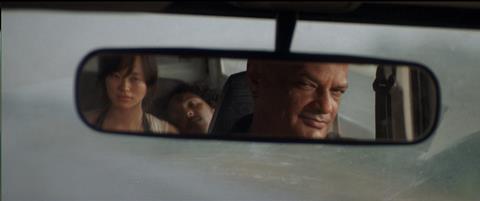Dir/scr. Vimukthi Jayasundara. Sri Lanka-France. 2009. 86 mins.

Sri Lankan director Vimukthi Jayasundara won the Camera d’Or at Cannes in 2005 for The Forsaken Land, a bleak allegory of his country’s bloody civil war. His second feature is an impenetrable but also densely poetic work of great formal beauty that will inevitably play only to the most ethereal reaches of the arthouse spectrum.
If it all sounds like the dramatisation of one of Bob Dylan’s more visionary ballads, in a sense, that’s also how it looks
The film goes on to Toronto after its prestigious Venice Competition berth, and it looks sure to notch up further festival action, and possibly even some limited theatrical action, as word of mouth spreads among rapt (or at least tedium-tolerant) cineastes.
The story pans out across a succession of symbolic tableaux. First we see a semi-naked young man (Laknath) falling into the sea, apparently from the sky. He later turns up in the middle of a riot in an unnamed city, where looted televisions and computers litter the streets and men armed with sticks are attacking someone dressed in a Mickey Mouse suit (one of the film’s more gratuitously absurd moments). He rescues a young girl (Lu) – perhaps a prostitute, we’re never entirely sure – but she goes off with the bald driver who gives the couple a lift in his minivan.
With the city now left behind, the man wanders the verdant countryside and meets a woman who seems to be, or have been, his brother’s fiancée (Fernando). Meanwhile – or in a different time frame altogether, it’s impossible to be sure – two fishermen are sitting on a rock, helping each other remember the details of old legends about kings and princesses. Later the young man watches a dog feast on the caracasse of a cow, and has his fortune told by a soothsayer with a caged green parrot.
If it all sounds like the dramatisation of one of Bob Dylan’s more visionary ballads, in a sense, that’s also how it looks. Only the initiated will be aware that the film’s elliptical story derives in large part from the Mahavamsa, or ‘Great Chronicle’ – a verse history of the legendary early kings of Sri Lanka, like Pandukhabaya, who survived all his evil uncles’ attempts to kill him off while still a boy.
In an extreme symbolic key, Jayasundara seems to be probing a foundation myth that has been coopted by both Tamil and Sinhalese nationalists for political ends. But few of the film’s small band of potential admirers are likely to pick up on this undertow.
The director’s regular DoP, Channa Deshapriya, creates painterly landscape spreads, picking out ghostly burnt trees in the rising mist. And Laksham Joseph de Saran’s haunting muscial soundtrack, consisting of breathy flute melodies over sombre held bass notes, oozes melancholic atmosphere, and complements the sensitive sound design, which creates a background static of leaves, crickets and birdsong.
Production companies
Les Films Hatari
Unlimited
International sales
Artscope
+33 1 53 34 90 20
Producers
Michel Klein
Philippe Avril
Cinematography
Channa Deshapriya
Production design
Lal Harendranath
Editor
Gisele Rapp-Meichler
Music
Laksham Joseph de Saran
Main cast
Thusitha Laknath
Kaushalya Fernando
Huang Lu

























